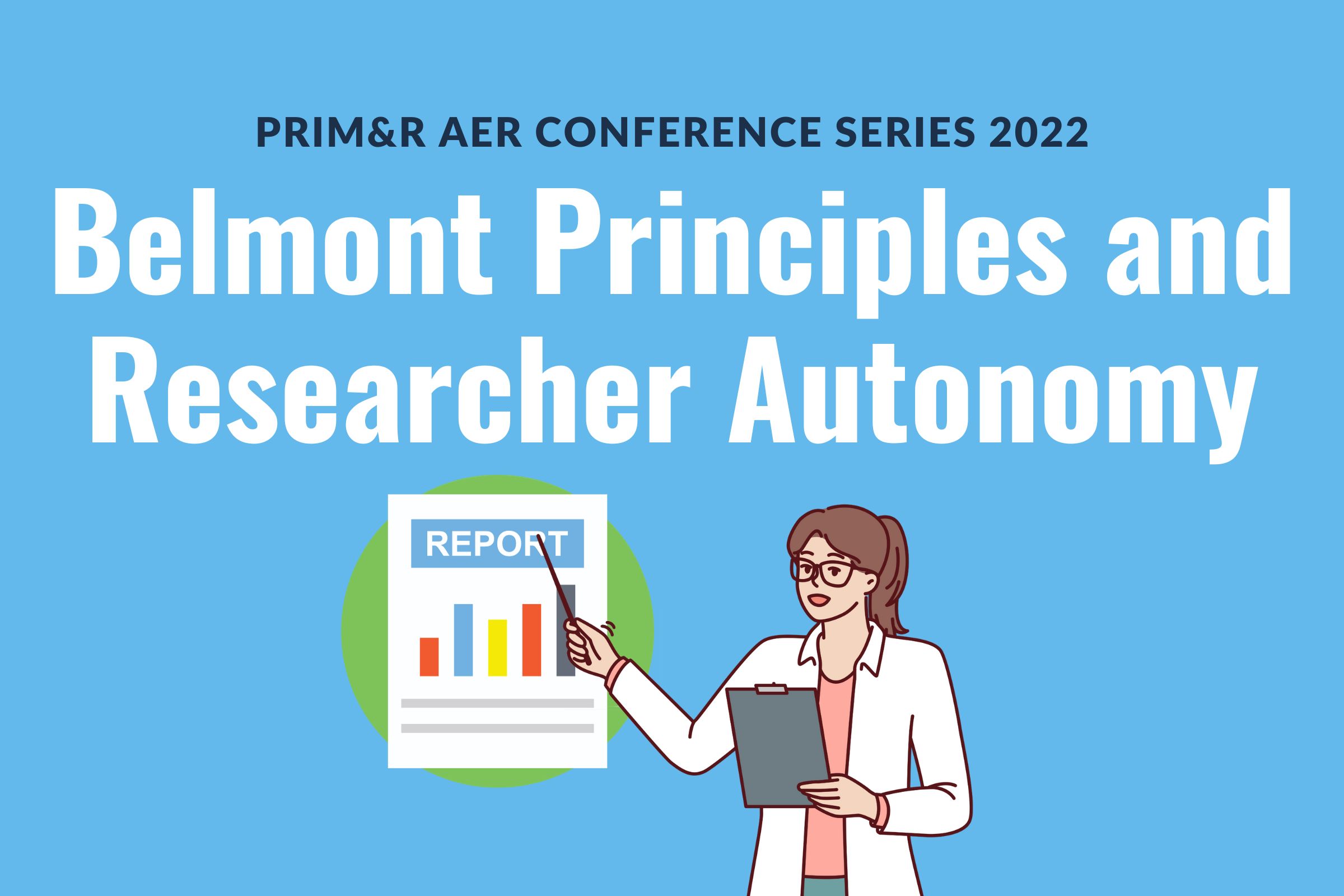The 2022 Advancing Ethical Research (AER22) Virtual conference is hosted by Public Responsibility in Medicine and Research (PRIM&R) “works to ensure the highest ethical standards in research by providing education and other professional resources to the research and research oversight community.” The AER22 conference provided valuable networking opportunities for research institutions and regulatory administrators. Additionally, institutions presented posters and informational sessions on topics related to research ethics in human subjects research.
Karen Froud, Ph.D., Myra Luna Lucero, Ed.D., & Kailee Kodama Muscente, Ed.M. presented a poster at AER22 entitled “Belmont Principles and Researcher Autonomy: Human Subjects Research Compliance and Safety During COVID-19 and Beyond.” on research compliance challenges associated with conducting research during the pandemic:
- Phased approach to in-person research during the pandemic post-lock down
- Steps for safely returning to in-person research
- Founding of the Research Compliance & Safety Committee (RCSC)
- Development of disaster response and research reactivation efforts for any emergency
Institutional Review Board (IRB) oversight roles and capabilities were stretched to new limits in response to the COVID-19 emergency. During the pandemic shutdown, researchers needed:
- Up-to-date, accurate, and reliable information reflecting a rapidly-changing research context
- Guidance and support to effectively protect their participants, their research teams, and themselves
Researcher needs did not evaporate as the pandemic abated and research ramped up. New concerns and questions arose with every shift in the research landscape. Researchers were impacted by:
- Rapid, conflicting, evolving, or confusing guidelines imposed by different organizations
- Campus officials
- Governmental agencies
- Funding organizations
- Lack of clarity for returning to research in different contexts
- On campus
- In the field
- Internationally
Researchers needed reassurance and leadership with the knowledge that experts were working to protect and support participants and the overall research community.
Formation of the RESEARCH COMPLIANCE AND SAFETY COMMITTEE (RCSC):
- A coalition of content knowledge experts from the college community.
- A centralized team to provide comprehensive guidance during a period of profound uncertainty.
In the RCSC, we directly communicated with researchers on critical issues:
- How to safely halt in-person research data collection?
- Who might be harmed if studies were suspended too abruptly, or remained suspended long-term?
- What forms might such harms take, and how are they most effectively mitigated?
We provided information and insights throughout the decision-making process:
- Websites, guides, templates, and regular email alerts
- Collected surveys to assess urgent needs
- Conducted individual researcher interviews
- Weekly / Monthly / Semesterly reports (more frequent during the height of the pandemic)
We balanced our regulatory and oversight roles with ethical values:
- Recognize the impact of shutdowns on researchers and participants
- Seek to understand contingent fear, anxiety, and concern
- Researchers engage the community and view their role as more than “just a job”
- Care for YOURSELF, Care for OTHERS, Care for the COMMUNITY
- Safety and risk mitigation plans were developed that were flexible enough for researchers to individualize their approaches, reflecting participants’ needs
- “Job Safety Assessments (JSAs)” were conducted for each individual research group to capture individualized on-campus research lab or center risks
- JSAs allowed us to tailor responses to
- Specific needs
- Specific populations
- Specific study methods
- IRB staff and RCSC members were available for individualized discussions
- We worked to ensure that policy implementation reflected the specific needs and concerns of each research team, their methods, participants, and risk/benefit ratios
- The burdens imposed by pandemic shut-downs and ramp-up procedures were shared
- We training modules for all research personnel (e.g., "Ethics Amid Uncertainty" training modules)
- Additional training needs specific to particular research groups were identified, and those needs were immediately met
- The role of "Research Safety Monitor" was introduced, to permit identification of a point person for each research team to:
- Support the flow of communication between researchers and IRB administrators
- Give each team an internal structure for accountability and monitoring
- Share the burden of responsibility for compliance with new procedures
CONTINUING THE RCSC ROLE
The RCSC maintains a campus presence to:
- Identify and mitigate risk in research contexts
- Sustain extant policies and procedures post-pandemic
- Adapt as a community for greater preparedness in future emergencies
- Maintain study ramp-up and ramp-down procedures for any emergency
- Prepare researchers to effectively protect participants
